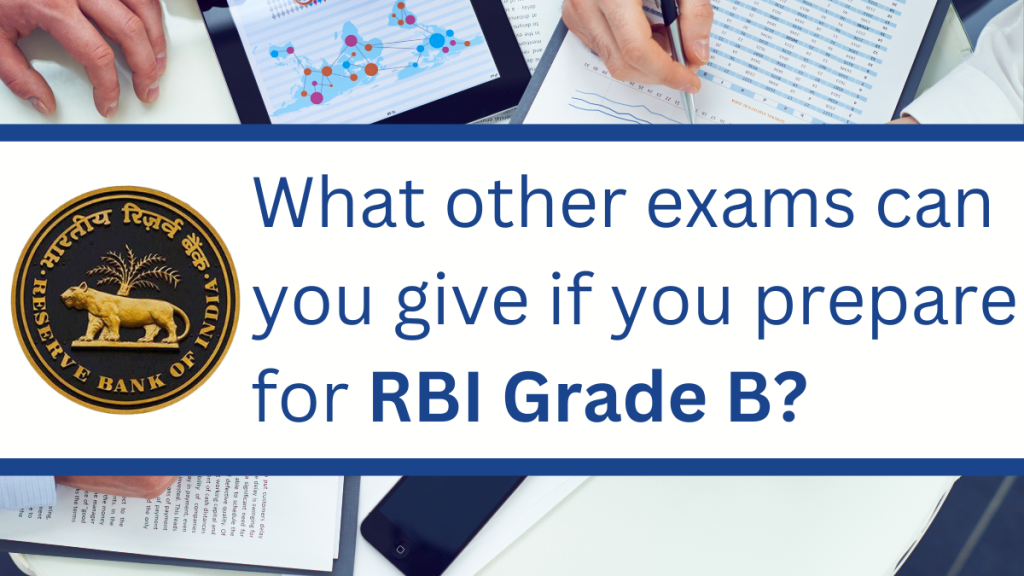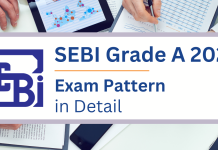Never put all your eggs in one basket. When it comes to career choices, this advice has helped countless individuals from spending extra years preparing and exploring alternative career paths when their initial plans don’t always unfold as expected. Plans B and C should always be ready in case your one true aspiration faces some setbacks.

Especially with government exams, in light of the intense competition and the time wise investment they require in terms of coaching or even a break year for some students, it is critical to make sure you have other options in hand. Conversely, your alternate choices should not deviate and branch out too far from plan A. This could result in loss of focus and most likely even burnout. Preparing for allied subjects is the best course of action to ensure you don’t have too much information to memorize at once and you get to optimize all opportunities available to you based on your preparation.
If you are passionate about and wish to enter the world of finance through the stability offered by government jobs, you will most likely be preparing for the RBI Grade B exam. But you should also have similar alternatives in mind. Your backup plans should be other banking exams with a similar course of preparation so that you don’t have to do twice the work to be eligible for and qualify for two exams. It’s like a two bird with one stone situation.
This is why for all banking aspirants; we will cover exams you can be ready to appear for by studying for just one exam and some extra preparation specific to the other exam.
RBI Grade B Exam Syllabus and Preparation
The RBI Grade B exam is an exhaustive assessment of an individual’s awareness, understanding and proficiency regarding core Finance, Economics, Banking Operations, Quantitative Skills, Analytical Skills, General Knowledge and Writing Aptitude.
The exam occurs in three stages: prelims, mains, and interview. The prelims consists of 200 objective questions covering the English Language, Qualitative Aptitude, Reasoning Ability, and General Awareness. Take a look at the RBI Grade B syllabus in the table below.
| RBI Grade B Stage 1 (Prelims) | Syllabus |
| English Language | |
| Quantitative Aptitude | |
| Reasoning Ability | |
| General Awareness |
Once you clear the prelims cutoff, you can progress to the mains paper. This part of the exam is divided into three different papers. The first paper of mains covers Economic and Social issues (ESI). It consists of 34 questions out of which 30 are objective and 4 are descriptive.
The second paper of the second stage of the RBI Grade B exam focuses on English Comprehension and Writing Skills. This paper consists of 3 questions requiring descriptive answers.
The final paper of the mains exam focuses on the individual’s knowledge of Finance and Management. This section consists of 34 questions and like Paper I, 30 of these questions are objective and the rest require descriptive answers.
Candidates who clear the mains paper of the RBI Grade B exam then give the final phase of the exam, which is the interview after which appointment of successful candidates to managerial positions in different departments of the RBI begins. Covering the total RBI Grade B course, ixamBee helps you prepare for two other banking exams
| RBI Grade B Stage 2 (Mains) Paper I | Syllabus |
| Economic and Social Issues (ESI) Growth and Development Indian Economy Globalization Social Structure of India | |
| RBI Grade B Stage 2 (Mains) Paper II | English Comprehension Writing Expression |
| RBI Grade B Stage 2 (Mains) Paper III | Finance and Management: Financial Systems, Finance Markets, Risk Management, Corporate Governance, Fundamentals of Management, and Organizational Behaviour Ethics at the Workplace |
Now let us take a look at two other banking exams, SEBI and NABARD, and their syllabus.
SEBI Grade A Exam: What it is and Syllabus
The SEBI Grade A exam is conducted by the Securities and Exchange Board of India (SEBI) to recruit Assistant Managers (Officer Grade A) for various departments. The SEBI exam is used to select candidates for different streams within SEBI, such as general, legal, information technology, engineering, research, and official language. By clearing the SEBI exam, you become eligible for the post of Assistant Manager (Officer Grade A) in your chosen stream. The SEBI Grade A exam consists of three stages: preliminary exam, mains exam, and interview.
If you choose the “General” stream under your SEBI optional papers, the syllabus of the entire examination is almost a carbon copy of the RBI Grade B syllabus. Following is the syllabus of the SEBI Grade A examination.
The first phase of the SEBI exam consists of two papers that are fully objective, each of 100 marks, whose score will only be used to shortlist candidates for the second phase. An effective way of preparation is by practicing SEBI Grade A Phase 1 mock tests. The two papers in stage one has the following syllabus:
| SEBI Grade A Phase 1 | Syllabus |
| Paper 1 | General Awareness |
| English Language | |
| Quantitative Aptitude | |
| Reasoning | |
| Paper 2 | General Stream: Commerce, Accountancy, Management, Finance, Costing, Companies Act, Economics |
After qualifying the cutoff for the SEBI Grade A Phase 1 exam, students will move on to Phase 2. This exam is also divided into two papers, one objective and the other descriptive. Paper 1 within Phase 2 will consist of a descriptive test in English. Paper 2 will have stream specific objective questions. Students who choose the general stream will come across topics that are also covered in the RBI Grade B exam.
| SEBI Grade A Phase 2 | Syllabus |
| Paper 1 | English (Descriptive) |
| Paper 2 | General Stream: Commerce, Accountancy, Management, Finance, Costing, Companies Act, Economics |
After qualifying Phase 2 of the SEBI Grade A exam, you are eligible for the final interview round. As you can see, almost all topics of the RBI Grade B and SEBI Grade A exam coincide with each other. The General Awareness, Quantitative Aptitude, English Language and Reasoning are identical across the RBI Grade B and SEBI Grade A government exams. Regardless of the order in which these topics are assessed, an in-depth study of Commerce, Economics, Finance, and Management helps you be ready for both RBI Grade B and SEBI Grade A exams. With ixamBee, you can prepare for this exam through the SEBI Grade A online course.
So far you can qualify two exams with the preparation of one, but we can make it three! NABARD is another government exam that RBI Grade B exam preparation covers.
NABARD Exam: What it is and Syllabus
The NABARD exam, led by the National Bank for Agriculture and Rural Development, opens doors to key Officer roles vital for India’s rural progress. This exam is designed to recruit skilled individuals for Officer Grade A and B roles, instrumental in driving NABARD’s goal of fostering rural growth through financial and technical aid.
The Grade A qualification is tailored for university graduates specializing in Agriculture, Economics, Rural Development, and related areas. Those who pass the exam become Assistant Managers, contributing to varied sectors like Agricultural Loans, Rural Planning, Development, and more.
NABARD Grade B level is aimed at those with postgraduate degrees across any field of study. These candidates, upon selection, step into Manager roles and oversee broad responsibilities, including managing agricultural credit cooperatives, project drafting and supervision, and so on. Like other banking tests described, the NABARD exam involves three phases: two written tests followed by an interview.
One thing to note is that the exams for NABARD Grade A and Grade B have the same syllabi. Let’s explore the syllabus of this exam. You can access the full study material for these government exams through ixamBee’s NABARD Grade A online course.
The prelims paper consists of aptitude related objective questions that cover two extra topics than the previously mentioned exams. Computer Knowledge and Decision-Making are additional topics one must go over while appearing for this exam and preparing for RBI Grade B and SEBI government exams.
| NABARD Grade A and Grade B Phase 1 | Syllabus |
| General Awareness | |
| English Language | |
| Quantitative Aptitude | |
| Reasoning | |
| Computer Knowledge | |
| Decision Making |
The second stage or mains exam of NABARD Grade A has two papers and NABARD Grade B has three. These exams include Agriculture and Rural Development topics. Something to note is that these two topics are not covered under the other two government banking exams mentioned in this blog.
| NABARD Grade A Phase 2 | Syllabus |
| Paper 1 | English (Descriptive) |
| Paper 2 | Economic and Social Issues, Agriculture, Rural Development |
The Grade B mains exam has an additional paper on Finance, Management, Statistics, and Economics. Those appearing for the NABARD Grade B mains exam will have to keep the following syllabus in mind.
| NABARD Grade B Phase 2 | Syllabus |
| Paper 1 | English (Descriptive) |
| Paper 2 | Economic and Social Issues, Agriculture, Rural Development |
| Paper 3 | Development Economics, Statistics, Finance, Management, Leadership, Human Resource Development, Communication |
It is evident that in Paper 3 of the above exam, except for Agriculture, Rural Development, Human Resources Development, and Communication all topics are covered under the preparation of the RBI Grade B exam.
The Preparation
Preparing for three government exams seems like a tall order. But we just discovered that if you prepare for one of these exams, you are set to appear for others as well.
While the RBI Grade B, SEBI Grade A, and NABARD exams have distinct nuances, a significant portion of their syllabus overlaps. To effectively prepare for all three (or at least two), adopt a smart approach. First, focus on building a strong foundation in common areas like Quantitative Aptitude, Reasoning Ability, English Language, and General Awareness. Utilize mock tests and previous years’ question papers for all three exams to identify these commonalities. General Awareness and Current Affairs are part of all these exams. To stay up to date with new developments in national and global affairs for giving competitive exams, you can discover ixamBee’s Beepedia.
Next, dedicate separate study slots to delve into the specific subject areas of each exam. For SEBI, focus on securities market regulations. For NABARD, ixamBee already has in place a study plan which can be easily incorporated with the preparation for other banking exams. When it comes to NABARD, prioritize Agriculture and Rural Economics. By strategically allocating study time and strategically utilizing the core syllabus overlap, you can become a strong candidate for multiple exams without losing focus on your RBI Grade B dream job. Remember, consistency and a well-planned approach are key to excelling in all three exams. It’s now three birds one stone kind of situation.
Conclusion
In conclusion, aiming for the RBI Grade B exam proves to be a strategic springboard for aspirants targeting careers in regulatory bodies like SEBI and NABARD. The comprehensive nature of the RBI Grade B syllabus lays a strong foundation for these exams. With a focused approach that leverages the overlap and builds upon specific areas, you can efficiently conquer all three exams and open doors to a fulfilling career in India’s financial sector. Remember, consistent effort, strategic planning, and utilizing the synergies between these exams will be your key to success. So, start preparing with confidence, and watch your dream career in financial regulation come true.
To help you prepare 50% faster for competitive exams, ixamBee provides a free Mock Test Series and all the Current Affairs in English and Current Affairs in Hindi in the BeePedia capsules for GA Preparation. You can also get the latest updates for Bank PO, Bank Clerk, SSC, RBI Grade B, NABARD, and Other Government Jobs.
Also Read:
Which is a Better Career for the Long Term, UPSC or RBI Grade B?
3 Realistic Tips to Avoid Burnout amid SEBI Grade A Preparation
SEBI Grade A 2023: Prelims Previous Years Cut off














